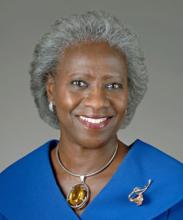
February, 2020
DR. VALANTINE'S FOOD FOR THOUGHT

Hannah A. Valantine, MD Chief Officer for Scientific Workforce Diversity
This month offered celebrations of stellar African American figures and accomplishments in many fields, including science. In honor of the occasion, this month’s issue will highlight the promise of the past, present, and future, focusing on one of Chicago’s first African American physicians, encouraging URM scientific workforce trends, a selection of current noteworthy figures, and a pioneering NIH program designed to diversify the biomedical professoriate.
Notable Black History Month Figure: Dr. Daniel Hale Williams
In honor of black history month, we are featuring an edited excerpt of NHLBI’s “African Americans Trailblazing Heart Health” column on Daniel Hale Williams, MD.
Dr. Daniel Williams was one of Chicago’s first African American physicians, having received his medical degree from Northwestern Medical School in 1883. During a time period in American history of extreme racial segregation, Dr. Williams founded Chicago’s Provident Hospital and Training School for Nurses in 1891 – which became the first black-owned and operated non-segregated hospital in the US that also provided training for black doctors and nurses. Two years later, Dr. Williams became the first physician to successfully perform open heart surgery on the pericardium to repair a stab victim. He then went on to found the National Medical Association – a professional organization for black medical practitioners because they were not allowed to become members of the American Medical Association at the time. Overall, Dr. Williams was a pioneering physician and a champion for racial equality in the practice of medicine. His legacy continues.
The Pipeline Continues to Pump
Recent data from the NSF Survey of Earned doctorates shows continual progress is being made diversifying the scientific workforce, with the pool of URM PhD recipients increasing. Over 100 more Black or African American PhDs were produced in 2018, resulting in a roughly 4% increase compared to the year prior. Within the life sciences specifically, 587 Black or African Americans obtained PhDs in 2018, compared to 318 in 2008. Of the nearly 600 Black or African American doctorate recipients, 43.9% had definitive post-graduation commitments in academia. This successful transition of a major portion of the URM community further underscores the growing pool of candidates representing diverse backgrounds, from which academia can draw on to diversify its professoriate.
Future Leaders: Putting a Face to Success
Black history is not confined to the past. It is being made every day by successful Black and African American people, including researchers here at the NIH at various stages of the scientific workforce.
Dr. Michele K. Evans,senior investigator, internist, and medical oncologist, serves as Deputy Scientific Director (NIA) and conducts clinical and basic bench research on the biology of health disparities. Dr. Sean Agbor-Enoh is an NIH Distinguished Scholar and tenure-track investigator at NHLBI (Pulmonary Branch) with a joint appointment as a lung transplant pulmonary physician at Johns Hopkins; his laboratory develops novel approaches to detect and treat transplant rejection, to ultimately prolong the lives of transplant patients. Dr. Sadhana Jackson is an Assistant Clinical Investigator (Neuro-Oncology Branch) at NCI and a NIH Distinguished Scholar. Inspired by her medical training, her novel research focuses on the blood-brain barrier complexities and their relationship to glioma treatment resistance. Dr. Lyl Tomlinson is a Health Science Policy Analyst, and former AAAS Science Policy Fellow, whose science communication training from trained scientists and others strengthened his science policy skillset, allowing him to combine his neuroscience background and internationally awarded communication skills to serve NIH programs and the scientific workforce. Cedric Mutebi is a NIH post-baccalaureate fellow and a developing leader in the field of public health; he recently completed a prestigious internship at the Association of American Medical Colleges (AAMC), and lead various initiatives, including a successful effort to train 1,040 people in CPR.
These promising individuals, and many others, embody the promise of Black and African American contributions in science and related fields.
Taking the 'FIRST' Step to Diversify the Professoriate: Systematic Approach
NIH recently took a major step in addressing the gap in underrepresented biomedical research faculty—a pioneering program (lead in part by our office) is attempting to create scientific cultures of inclusion, by integrating cohorts of faculty from diverse backgrounds into the professoriate. This initiative, the Faculty Institutional Recruitment for Sustainable Transformation (FIRST), will work to support over a dozen universities/medical schools, adding roughly 10 assistant professors at each institution. The proposed $241 million program would span 9 years and provide partial funds for: cohort hiring, start-up funds, professional development and mentoring, institution wide systems to address systemic/cultural issues, and a data coordination center to conduct independent program evaluation. Based on the cohort model literature and our similar, successful intramural initiative, the Distinguished Scholars Program, FIRST will recruit individuals with outstanding research qualifications who have demonstrated commitment to diversity and inclusion. You can find more information listed in the Science article here.

The links above are pulled from the top news articles trending on the subject of diversity in science and technology.
The stories selected are not a reflection of the views of the National Institutes of Health.

